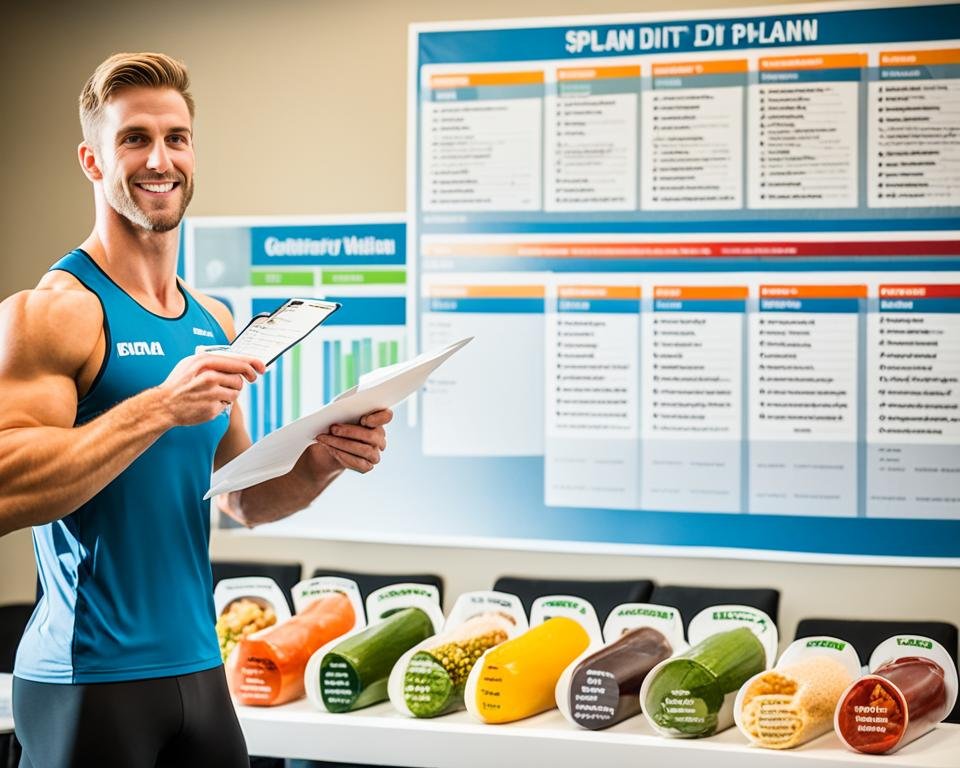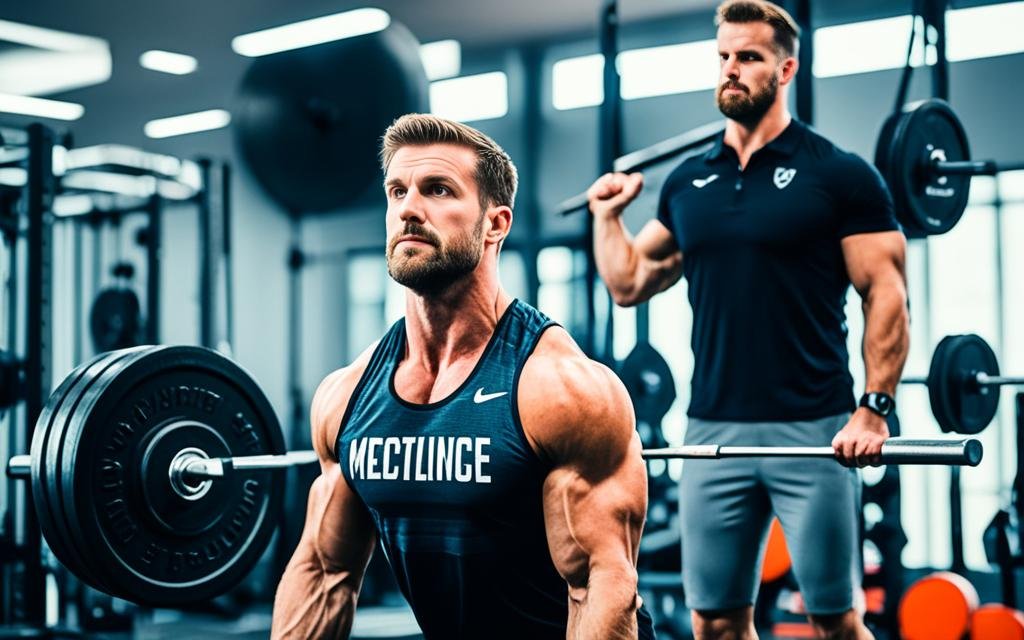Achieving peak performance in sports requires a combination of skill, training, and dedication. However, many athletes overlook one crucial aspect that can significantly impact their performance: nutrition. A well-designed and balanced sports nutrition and diet plan can fuel the body, optimize energy levels, promote muscle repair and recovery, and ultimately enhance athletic performance.
In this comprehensive guide, we will explore the role of nutrition in sports and provide valuable strategies and tips for athletes to improve their nutrition and diet for optimal performance. From understanding the science of sports nutrition to customizing diets for specific athletic needs, this guide will cover all aspects of sports nutrition to help athletes reach their full potential.
Key Takeaways:
- Sports nutrition and diet play a crucial role in optimizing athletic performance.
- A well-designed nutrition plan can fuel the body, promote muscle repair, and enhance recovery.
- Understanding the science behind sports nutrition is essential for athletes to make informed dietary choices.
- Customizing diets based on specific athletic needs, such as endurance or strength training, can maximize performance.
- Proper hydration, nutrient timing, and meal planning are key components of an athlete’s nutrition strategy.
Understanding the Role of Nutrition in Athletic Performance
Nutrition plays a crucial role in optimizing athletic performance. Proper fueling of the body with the right nutrients can enhance strength, endurance, and overall physical performance. In this section, we will explore the science behind sports nutrition and its direct impact on athletic performance.
The Science of Sports Nutrition
Sports nutrition is a specialized field that combines the principles of exercise physiology and nutrition science. It focuses on providing athletes with the necessary nutrients to support their training, recovery, and performance goals. The primary goal of sports nutrition is to optimize energy production, enhance muscle growth and repair, and prevent nutrient deficiencies that may compromise performance.
“Sports nutrition is a multidisciplinary field that combines the sciences of physiology, biochemistry, and nutrition to provide athletes with evidence-based strategies for maximizing their athletic potential.” – Dr. Michael Smith, Sports Nutrition Expert
By understanding the science behind sports nutrition, athletes can make informed dietary choices that will support their athletic goals and improve their overall performance.
Fueling Your Body for Optimal Performance
When it comes to fueling your body for optimal performance, it’s important to understand the energy needs of athletes. Athletes require a higher caloric intake compared to sedentary individuals due to the demands of intense training and competition. Meeting these energy needs is crucial for maintaining energy levels, supporting muscle growth, and preventing fatigue.
Athletes should focus on consuming a well-balanced diet that includes an appropriate balance of macronutrients and micronutrients. Macronutrients, including carbohydrates, proteins, and fats, provide the body with energy, while micronutrients, such as vitamins and minerals, are essential for various physiological processes and overall health.
The Balance between Macronutrients and Micronutrients
Macronutrients and micronutrients both play important roles in athletic performance. Athletes should aim to consume the right balance of macronutrients and micronutrients to optimize their performance and recovery.
Macronutrients: These are the nutrients that provide the body with energy. Understanding the role of macronutrients in athletic performance is crucial for athletes:
- Carbohydrates: Carbohydrates are the primary source of energy for high-intensity exercises. They should make up a significant portion of an athlete’s diet to fuel both workouts and optimal performance.
- Proteins: Proteins are important for muscle growth, repair, and recovery. Athletes should consume an adequate amount of protein to support optimal muscle function.
- Fats: While often stigmatized, fats play an important role in energy production and hormone regulation. Athletes should focus on consuming healthy fats to support their performance and overall health.
Micronutrients: These are essential for various physiological processes in the body. Athletes should ensure they are getting an adequate intake of vitamins and minerals through a well-balanced diet. Ensuring sufficient micronutrient intake can support immune function, reduce inflammation, and promote overall health and wellbeing.
Understanding the role of nutrition in athletic performance is essential for athletes who want to maximize their potential. By focusing on fueling their bodies with the right nutrients, athletes can optimize their performance, support their training and recovery, and achieve their goals.
Designing Your Athlete Meal Plan
When it comes to optimizing athletic performance, proper nutrition is key. Designing a well-balanced meal plan tailored to the specific needs of athletes is crucial for fueling workouts, supporting recovery, and enhancing overall performance. In this section, we will explore the practical aspects of athlete meal planning, including caloric requirements for different sports and meal timing strategies for training and competition.
Caloric Requirements for Different Sports
Understanding the caloric requirements of athletes is essential for designing an effective meal plan. Different sports have varying energy demands, so it’s important to consider these factors when determining calorie intake. Endurance athletes, such as marathon runners or cyclists, may require more calories to sustain prolonged exercise, while power athletes, like weightlifters or sprinters, may have higher demands for short bursts of intense activity.
To determine the appropriate caloric intake for specific sports, athletes can consult with a registered dietitian or sports nutritionist who can assess individual factors such as body composition, training volume, and goals. By tailoring caloric intake to the demands of their sport, athletes can ensure they have the energy needed to perform at their best.
Meal Planning and Timing for Training and Competition
In addition to meeting caloric requirements, strategic meal planning and timing can significantly impact sports performance. Here are some guidelines athletes can follow:
- Fuel up before workouts: Consuming a balanced meal or snack containing carbohydrates and protein 2-3 hours before training can provide the necessary energy and nutrients to fuel workouts.
- Snack wisely: For longer training sessions or when training intensity is high, incorporating small, nutrient-dense snacks can help maintain energy levels and support endurance. Examples include fruit with nut butter, Greek yogurt, or trail mix.
- Prioritize post-workout nutrition: Consuming a combination of carbohydrates and protein within 30-60 minutes after training can aid in muscle recovery and replenish glycogen stores. Options include a protein shake, a turkey sandwich with whole grain bread, or a smoothie with fruit and yogurt.
- Hydrate adequately: Staying hydrated is crucial for optimal performance. Athletes should aim to drink water regularly throughout the day and during training sessions. Electrolyte-rich beverages may be beneficial for longer workouts or in hot and humid conditions.
- Individual preferences: Athletes should consider their own preferences and digestive sensitivities when planning meals and snacks. Experimenting with different food combinations and timing can help identify what works best for each individual.

By paying attention to caloric requirements and strategically planning meals and snacks, athletes can optimize their nutrition to support training, performance, and recovery. The next section will explore the key components of a balanced athlete diet, providing valuable insights into achieving optimal nutrition for sports performance.
Key Components of a Balanced Athlete Diet
When it comes to optimizing athletic performance, a balanced diet is essential. Athletes require specific nutrients to fuel their bodies and support their intense training regimens. To maintain a well-rounded and nutritious diet, athletes should focus on incorporating key components, including protein, carbohydrates, fats, and other essential nutrients.
Protein: Protein plays a vital role in repairing and building muscles, making it a crucial component of an athlete’s diet. Good sources of protein include lean meats, poultry, fish, eggs, dairy products, beans, and legumes. Adequate protein intake helps athletes recover from intense workouts and supports muscle growth and repair.
Carbohydrates: Carbohydrates are the primary source of fuel for athletes, providing the energy necessary for intense training sessions and competitions. Whole grains, fruits, vegetables, and legumes are excellent sources of carbohydrates. Athletes should aim for complex carbohydrates, which release energy slowly and sustain performance over extended periods.
Fats: Healthy fats are essential for athletes as they provide a concentrated source of energy and support various bodily functions. Include foods like avocados, nuts, seeds, olive oil, and fatty fish in the diet to ensure an adequate intake of healthy fats. It’s essential to choose unsaturated fats and limit saturated and trans fats.
Other Essential Nutrients: In addition to protein, carbohydrates, and fats, athletes need a variety of other essential nutrients to maintain optimal health and performance. These include vitamins, minerals, and antioxidants, which support overall bodily functions, muscle recovery, and immune health. Athletes can obtain these nutrients from a well-balanced diet that includes a variety of fruits, vegetables, whole grains, and lean proteins.
By incorporating these key components into their diet, athletes can ensure they are fueling their bodies appropriately and optimizing their performance on and off the field.
| Key Components | Examples |
|---|---|
| Protein | Lean meats, poultry, fish, eggs, dairy products, beans, legumes |
| Carbohydrates | Whole grains, fruits, vegetables, legumes |
| Fats | Avocados, nuts, seeds, olive oil, fatty fish |
| Other Essential Nutrients | Fruits, vegetables, whole grains, lean proteins |
Hydration Strategies for Athletes
In order to perform at their best, athletes must prioritize proper hydration. Staying hydrated is essential for maintaining optimal physical and cognitive function. Dehydration can lead to decreased performance, fatigue, muscle cramps, and even heat-related illnesses. Therefore, implementing effective hydration strategies is crucial for athletes to reach their full potential.
The Importance of Staying Hydrated
Hydration plays a vital role in athletic performance. When athletes are properly hydrated, their bodies can regulate temperature more efficiently, maintain blood volume, and deliver nutrients to working muscles. Keeping the body hydrated also aids in the removal of waste products and enhances recovery. Dehydration, on the other hand, can negatively impact performance and put athletes at risk for various health issues.
Monitoring Hydration Status and Understanding Fluid Needs
It is important for athletes to monitor their hydration status to ensure they are adequately hydrated. This can be done by paying attention to thirst, urine color, and body weight changes. Athletes should strive to drink fluids before, during, and after exercise to maintain proper hydration levels.
Role of Supplements in Sports Nutrition and Diet
In addition to a well-balanced diet, athletes often turn to sports nutrition supplements to support their unique nutritional needs. These supplements can play a crucial role in enhancing performance, aiding recovery, and addressing specific deficiencies.
Commonly used by athletes, supplements provide a convenient way to obtain essential nutrients. They can help bridge any nutritional gaps and optimize overall health. However, it’s important to approach supplements with caution and understanding to ensure their safe and effective use.
When considering the role of supplements for athletes, it’s crucial to recognize that supplements alone cannot substitute a healthy diet. They are meant to complement a well-rounded nutrition plan, rather than replace it.
Let’s explore some common supplements used by athletes and their potential benefits and risks:
- Protein Supplements: Protein powders and shakes are popular among athletes as they provide a convenient source of high-quality protein. Protein supplements can support muscle repair, recovery, and growth.
- Creatine: Creatine is commonly used to enhance athletic performance, especially during high-intensity and short-duration exercises. It may increase muscle strength and power.
- Omega-3 Fatty Acids: Omega-3 supplements, such as fish oil capsules, are known for their anti-inflammatory properties. They may benefit athletes by reducing exercise-induced inflammation and promoting joint health.
- Vitamin and Mineral Supplements: Certain vitamins and minerals, such as vitamin D, iron, and calcium, are essential for optimal athletic performance. Athletes may consider supplementation if their diet lacks these nutrients or if they have specific deficiencies.
It’s important to consult with a healthcare professional or registered dietitian before incorporating any new supplements into your diet. They can provide personalized recommendations based on your specific needs and goals.
When choosing supplements, it’s crucial to prioritize quality and safety. Look for reputable brands that undergo rigorous testing for purity and effectiveness. Additionally, be mindful of potential interactions with medications or existing health conditions.

Remember, choosing and using supplements wisely is essential for athletes. By combining a well-balanced diet with appropriate supplementation, athletes can optimize their nutrition and support their overall performance and well-being.
Customizing Diets for Athlete Specific Needs
Every athlete has unique nutritional needs based on their sport, training regimen, and personal preferences. Customizing their diets is crucial to maximize performance and ensure they meet their nutrient requirements. In this section, we will discuss the specific nutritional needs of endurance and strength athletes, as well as considerations for vegetarian and vegan athletes.
Nutrition for Endurance vs. Strength Athletes
Endurance athletes require diets that support sustained energy levels and efficient recovery. They need a higher intake of carbohydrates for glycogen storage, which serves as a primary fuel source during endurance activities. Additionally, endurance athletes may benefit from consuming moderate amounts of protein to aid in muscle repair and adaptation.
Strength athletes, on the other hand, require diets focused on muscle growth, strength development, and recovery. These athletes benefit from higher protein intake to support muscle protein synthesis and repair. Additionally, they may require more calories overall to meet the demands of intense training.
To optimize performance, athletes should work with a registered dietitian or sports nutritionist to develop personalized meal plans that align with their specific athletic goals and training programs. These professionals can help fine-tune macronutrient ratios and calorie intake based on individual needs.
Considerations for Vegetarian and Vegan Athletes
Vegetarian and vegan athletes can meet their nutrient requirements by carefully planning their diets. Plant-based athletes should focus on consuming a variety of protein sources such as legumes, tofu, tempeh, seitan, and quinoa. Additionally, incorporating sources of high-quality fats like nuts, seeds, avocado, and olive oil can provide essential fatty acids.
It is crucial for vegetarian and vegan athletes to pay attention to specific nutrients that are commonly found in animal products. These may include vitamin B12, iron, zinc, and omega-3 fatty acids. Athletes following plant-based diets should consider incorporating fortified foods or supplements to ensure adequate intake of these nutrients.

Sports Nutrition Guidelines for Recovery
Proper nutrition plays a crucial role in the recovery process for athletes. By fueling the body with the right nutrients, athletes can optimize muscle repair and enhance their overall recovery. In this section, we will explore the importance of nutrition for recovery and provide valuable guidelines to support athletes in their journey towards optimal performance.
Recovery Foods and their Impact on Muscle Repair
One of the key factors in enhancing recovery is consuming the right foods. Nutrition-rich foods can promote muscle repair, reduce inflammation, and replenish energy stores. Incorporating the following recovery foods into your diet can have a significant impact on your overall recovery:
- Protein: Protein is essential for repairing and rebuilding muscles. Include lean sources such as chicken, fish, tofu, and beans in your recovery meals.
- Complex Carbohydrates: Complex carbohydrates provide a steady source of energy and support glycogen replenishment. Opt for whole grains, fruits, and vegetables to meet your carbohydrate needs.
- Anti-inflammatory Foods: Including foods with anti-inflammatory properties, such as berries, leafy greens, and fatty fish, can help reduce muscle soreness and inflammation.
- Hydrating Foods: Foods with high water content, such as watermelon, cucumbers, and citrus fruits, can help with rehydration and maintaining electrolyte balance.
By incorporating these recovery foods into your post-workout meals, you can provide your body with the necessary nutrients to support muscle repair and optimize recovery.
Nutrient Timing for Optimal Recovery
Aside from selecting the right foods, nutrient timing is also critical for maximizing the recovery process. Consider the following guidelines:
- Post-Workout Nutrition: Your body is most receptive to nutrient absorption immediately after exercise. Consume a balanced meal or snack within 30-60 minutes after your workout to provide your muscles with the necessary nutrients for recovery.
- Pre-Bedtime Snack: Consuming a small protein-rich snack before bed can support muscle repair and prevent catabolism during sleep.
- Daily Nutrient Distribution: Distribute your nutrient intake throughout the day to support sustained energy levels and regular muscle repair.
By aligning your nutrient intake with the demands of your training and recovery, you can optimize the effectiveness of your post-workout nutrition and enhance the overall recovery process.

Effective Sports Diet Tips for Weight Management
Managing weight is an important aspect of an athlete’s overall well-being and performance. Maintaining a healthy body composition is essential for optimizing athletic abilities and achieving desired fitness goals. Here are some effective sports diet tips for weight management:
- 1. Set Realistic Goals: Establish realistic weight goals based on your individual needs and sport requirements. Consult with a sports nutritionist or dietitian to determine a healthy weight range for your body type and athletic pursuits.
- 2. Prioritize Balanced Nutrition: Focus on consuming a well-balanced diet that includes a variety of nutrient-dense foods. Emphasize whole grains, fruits, vegetables, lean proteins, and healthy fats to fuel your body and support weight management.
- 3. Portion Control: Pay attention to portion sizes and practice mindful eating. Use smaller plates, bowls, and utensils to help control portion sizes, and listen to your body’s hunger and fullness cues.
- 4. Stay Hydrated: Adequate hydration is crucial for overall health and weight management. Drink plenty of water throughout the day to maintain hydration levels and support proper digestion and metabolism.
- 5. Monitor Caloric Intake: Keep track of your daily caloric intake to ensure it aligns with your weight goals. Consider using a food diary or mobile app to help monitor your calorie intake and make necessary adjustments.
- 6. Optimize Pre- and Post-Workout Nutrition: Prioritize nutrient-rich pre- and post-workout meals to fuel your performance and support recovery. Include a balance of carbohydrates, protein, and healthy fats to provide sustained energy and aid in muscle repair.
- 7. Seek Professional Guidance: If you’re unsure about how to manage your weight effectively, consult with a registered dietitian or sports nutritionist who can provide personalized guidance tailored to your individual needs and athletic endeavors.
By following these effective sports diet tips for weight management, athletes can maintain a healthy body composition and optimize their performance on and off the field.
Best Sports Nutrition Plan for Pre-Competition Meals
Proper nutrition before a competition is crucial for athletes to perform at their best. Pre-competition meals should provide the necessary fuel and nutrients to optimize performance and maintain energy levels throughout the event. Here are some key points to consider when planning your pre-competition meals:
- Timing: It’s important to time your meals properly to allow for digestion and to prevent discomfort during the competition. Aim to have a balanced meal 2-3 hours before the event, and a light snack 1-2 hours before to sustain energy levels.
- Carbohydrates: Pre-competition meals should be rich in carbohydrates, as they are the primary source of fuel for athletes. Opt for complex carbohydrates like whole grains, fruits, and vegetables to provide sustained energy.
- Protein: Including a moderate amount of protein in your pre-competition meal is essential for muscle repair and maintenance. Good sources of protein include lean meats, fish, eggs, and legumes.
- Hydration: Don’t forget to hydrate before the competition. Drink plenty of water throughout the day leading up to the event to ensure proper hydration.
Here is an example of a pre-competition meal:
| Meal Components | Example Foods |
|---|---|
| Carbohydrates | Whole grain pasta, brown rice, sweet potatoes |
| Protein | Grilled chicken breast, salmon |
| Fruits and Vegetables | Leafy greens, berries, broccoli |
Remember, every athlete is different, and it’s important to find the pre-competition meal plan that works best for you. Experiment with different foods and meal timings during training to determine what makes you feel energized and perform at your peak.
Healthy Eating Practices for Lifelong Sports Performance
In order to maintain lifelong sports performance, athletes must prioritize healthy eating practices to support their overall health and well-being. A balanced diet plays a crucial role in fueling the body, enhancing recovery, and promoting optimal performance. However, it’s equally important for athletes to develop a healthy relationship with food, avoiding restrictive or unhealthy behaviors that can negatively impact their physical and mental well-being.
Maintaining a Healthy Relationship with Food
Developing a healthy relationship with food is essential for athletes to achieve long-term success. It’s important to view food as fuel and nourishment for the body, rather than succumbing to fad diets or restrictive eating habits. Here are some tips to maintain a healthy relationship with food:
- Practice mindful eating: Pay attention to hunger and fullness cues, and eat slowly to fully enjoy and savor the flavors of your food.
- Listen to your body: Trust your body’s wisdom and eat when you are hungry, rather than following strict meal schedules.
- Avoid labeling foods as “good” or “bad”: Strive for balance and moderation, incorporating a variety of nutritious foods into your diet while still allowing yourself to enjoy treats in moderation.
- Seek support when needed: If you find yourself struggling with disordered eating patterns or body image issues, don’t hesitate to reach out to a registered dietitian or mental health professional who specializes in sports nutrition and eating disorders.
The Role of Diet in Long-term Athletic Health and Success
A healthy diet plays a crucial role in maintaining long-term athletic health and success. Proper nutrition provides the necessary nutrients for muscle recovery, immune function, and overall well-being. Here are some key points to consider:
“A healthy diet is not just about performance on the field, but also about overall health and well-being. By fueling your body with nutritious foods, you are setting a solid foundation for lifelong sports performance.” – [Name]
Adopting a balanced and nutrient-rich diet helps to optimize energy levels, support the immune system, and promote muscle repair and growth. Prioritize the following in your diet:
| Importance | Nutrient-Rich Foods |
|---|---|
| 1 | Lean proteins such as poultry, fish, and legumes to support muscle repair and growth. |
| 2 | Complex carbohydrates like whole grains, fruits, and vegetables to provide sustained energy. |
| 3 | Healthy fats from sources like avocados, nuts, and seeds for brain function and hormone production. |
| 4 | Plenty of fruits and vegetables for antioxidants, vitamins, and minerals. |
| 5 | Adequate hydration to support performance and recovery. |
To ensure long-term success, it’s important to focus on consistency and sustainability in your eating habits. Rather than relying on quick fixes or extreme dietary approaches, prioritize a well-rounded and balanced diet that can be maintained for the long run.
By following these healthy eating practices and fostering a positive relationship with food, athletes can fuel their bodies optimally, support lifelong sports performance, and enjoy the process along the way.
Sports Nutrition and Diet: Advancing Beyond General Health Guidelines
Athletes have unique nutritional needs that go beyond general health guidelines. To optimize performance and recovery, specialized nutrition strategies are essential. Understanding the specific requirements of athletes and tailoring their diets accordingly can make a significant difference in their athletic endeavors.
One important aspect of sports nutrition is providing the right balance of macronutrients (carbohydrates, proteins, and fats) and micronutrients (vitamins and minerals). Each nutrient plays a crucial role in supporting energy production, muscle development, and overall health. Athletes must prioritize nutrient-dense foods to ensure their bodies have the fuel they need for intense training sessions and competitions.
Hydration is also critical for athletes. Proper fluid intake helps regulate body temperature, maintain electrolyte balance, and support muscle function. Athletes should develop hydration strategies to ensure they are adequately replenishing fluids lost during exercise.
“Sports nutrition goes beyond general health guidelines, focusing on specialized nutrition for athletes. By understanding their unique needs and tailoring their diets accordingly, athletes can enhance their performance and recovery.”
Supplements can play a role in sports nutrition but should be used judiciously and under professional guidance. Some commonly used supplements by athletes include protein powders, creatine, and branched-chain amino acids. However, it is crucial to understand the potential benefits and risks associated with each supplement and consult with a sports nutrition expert before incorporating them into a diet.
Customizing diets based on individual athlete needs is essential for optimal performance. Endurance athletes, such as marathon runners, have different nutritional requirements compared to strength athletes, such as weightlifters. Additionally, vegetarian and vegan athletes need to carefully plan their diets to ensure they obtain all the necessary nutrients.
To illustrate the importance of sports nutrition beyond general health guidelines, consider the following table:
| Athlete | Sport | Specialized Nutritional Needs |
|---|---|---|
| Michael Phelps | Swimming | High carbohydrate intake for sustained energy during long training sessions |
| Simone Biles | Gymnastics | Emphasis on lean proteins for muscle repair and recovery |
| Lewis Hamilton | Formula One | Focus on hydration to combat high temperatures and physically demanding races |
By tailoring their nutrition plans to meet their individual needs, athletes can enhance their performance and achieve their athletic goals. Sports nutrition specialists can provide valuable guidance in creating personalized diet regimens that optimize overall health and athletic performance.
In conclusion, sports nutrition goes beyond general health guidelines to provide specialized nutrition for athletes. By understanding their unique nutritional needs and tailoring their diets accordingly, athletes can optimize performance and recovery, enabling them to reach new heights in their respective sports.
Conclusion
In conclusion, sports nutrition and diet play a vital role in optimizing athletic performance. Throughout this article, we have explored the science behind sports nutrition, the importance of proper fueling, designing athlete meal plans, key components of a balanced diet, hydration strategies, the role of supplements, and customizing diets for specific athlete needs.
By understanding the unique nutritional requirements of athletes, we can tailor dietary strategies to maximize energy levels, support muscle repair, and enhance recovery. Whether you’re an endurance athlete, a strength athlete, or follow a vegetarian or vegan diet, there are ways to ensure you are meeting your nutrient needs to perform at your best.
Remember, maintaining a healthy relationship with food is also crucial for long-term athletic success. It’s important to prioritize overall health and well-being, and to approach nutrition with a balanced and sustainable mindset.
Ultimately, by incorporating these sports nutrition and diet strategies into your routine, you can fuel your body for success and reach your full athletic potential.









